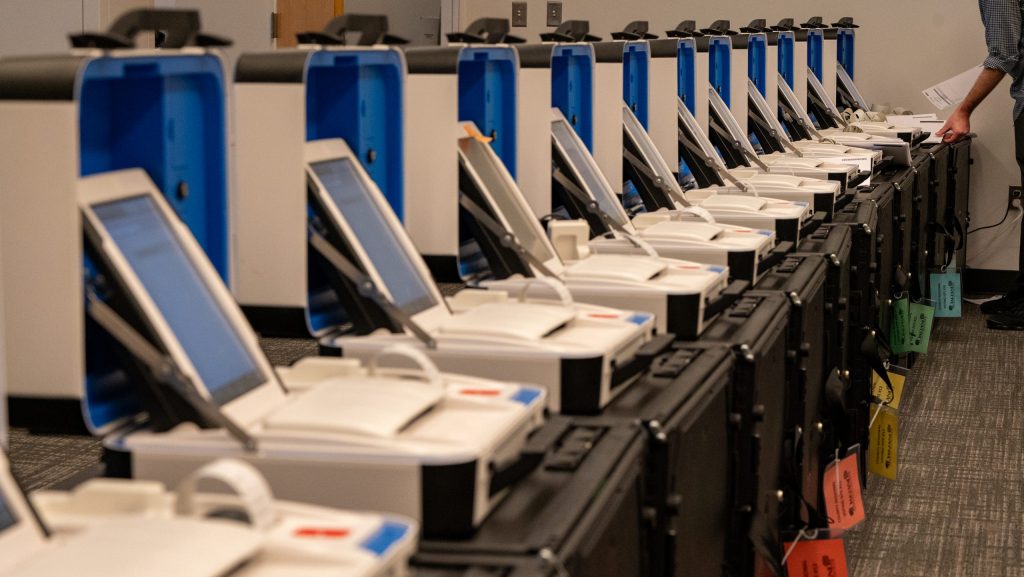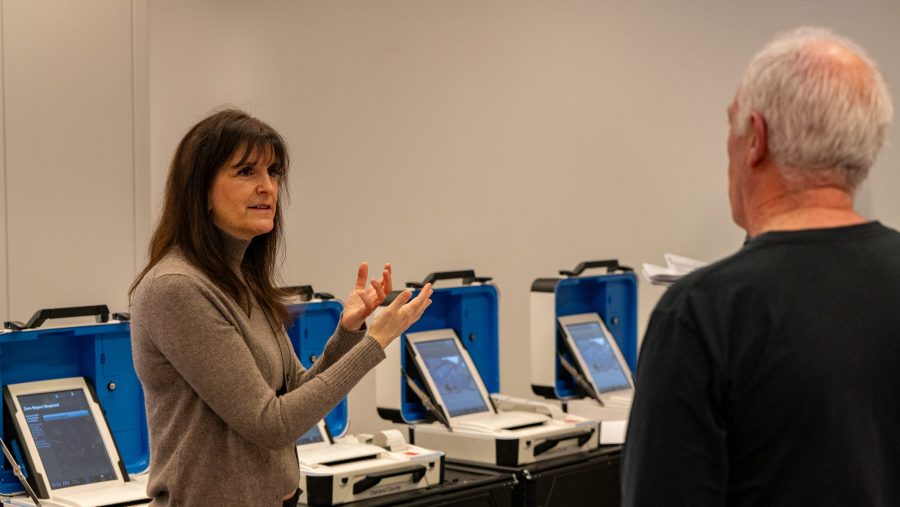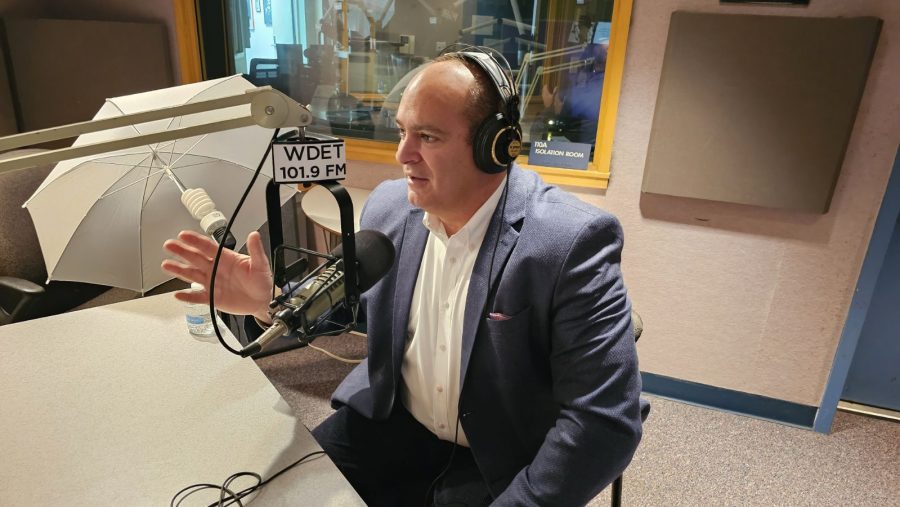Early in-person voting in Michigan’s presidential primary begins Feb. 17
State law allows a minimum of 9 days of early voting. Local clerks are taking steps to ensure it goes smoothly.

Oakland County Clerk Lisa Brown Brown says if a tabulator isn’t working properly, it won’t be used in the election.
Voters in Michigan’s presidential primary elections can start casting ballots in person on Feb. 17. A new state law allows a minimum of nine days of early voting at designated locations. Local election officials and county clerks have been working hard to make sure it goes smoothly.
Election workers test voting equipment
Oakland County has set up 18 regional early voting locations. On Feb. 7, County Clerk Lisa Brown and her staff tested the electronic tabulators being assigned to those locations.
They inserted test ballots one at a time into each machine. The tabulators counted the ballots, which were marked to produce a pre-determined result. Brown says the goal of that is to make sure what comes out of the machines matches what goes in.
“For example, there’s a ballot that will be overvoted, making sure that [the machine] is picking it up as an overvote,” Brown says. “All these different things to make sure that the tabulators are reading the ballots correctly and also tabulating the results correctly.”

Brown says if a tabulator isn’t working properly, it won’t be used in the election. Neither will the test ballots, which will be sealed and eventually discarded. This is one of the checks and balances Brown uses to ensure that Oakland County elections are accurate, fair and secure. She says the tabulators are not connected to the internet, so hackers can’t tamper with them. And the machines themselves won’t reveal the results until after the polls close on Election Day, Feb. 27.
“Every night the machines go into suspend mode, and then they’re brought back up,” Brown says. “And after Sunday’s voting, it goes into suspend mode and they can’t be powered up again until Tuesday evening.”
Testing and transparency
Brown says she wants voters to have confidence in elections and voting equipment. That’s why she opens these tabulator tests to the public so people can see how they work. Troy resident Kathleen O’Laughlin came to witness the process with a skeptical eye.
“I am just concerned that the elections are not fair and secure,” she said.
O’Laughlin describes herself as a constitutional conservative not affiliated with any party. She would not say if she thought the 2020 presidential election was stolen. But she says election officials shouldn’t dismiss questions about fraud, no matter how rare it actually is.
“I think that if you have 100 people in a precinct or in a community signing an affidavit saying there’s something wrong, then I think it needs to be investigated,” O’Laughlin said.
In fact, multiple investigations since 2020 have found no evidence of systemic election fraud.
Clerks test systems to disprove fraud claims
Anthony Forlini is the Macomb County clerk. Shortly after he was elected, he conducted a forensic audit of the county’s election server to make sure no one hacked it and tampered with the data.

“We went through a pretty rigorous process to look at that,” Forlini told WDET. “And we found that there was no outside interference with any of our equipment.”
Forlini leaves tabulator testing up to local clerks, but makes sure voters know when and where that’s happening. He says Macomb County does test its systems through a process called hash validation.
“Which basically says, ‘all right we’re testing it before and we’re testing it after,'” he said. “Did anybody get into the computer and change any of the programming? We would know that through the hash validations.”
Forlini says he welcomes questions from election doubters, but says discrepancies are usually the result of human error rather than fraud.
“Humans are going to make mistakes,” he said. “We try to minimize that through education and transparency.”
Humans have already made mistakes going into this month’s primary elections. Seventeen voters in Auburn Hills recently got the wrong absentee ballots for president in the mail. City Clerk Laura Pierce tells the Oakland Press they were placed in the wrong envelopes. She contacted all the affected voters and will flag the incorrect ballots, so they don’t get counted.
More: Are voters’ rights at risk if Trump is kept off Colorado ballot?
Auburn Hills is one of the few cities that did not ask Oakland County Clerk Lisa Brown to test its early voting equipment. Brown says that’s OK.
“I view democracy as a team sport,” Brown said. “We’re all on the same team to make sure our elections are accurate, secure, and fair and that every eligible voter has access to the ballot. So, whatever I can do to support our local clerks and ensure that our elections are run well in Oakland County, I’m going to do.”
And that includes answering questions of skeptical voters like O’Laughlin, who came away from the tabulator testing in Lisa Brown’s office with more confidence in the people overseeing the process.
“I think that they are very conscientious people and they do want to do the job that they’re supposed to be doing,” O’Laughlin said. “I’m very satisfied with what they’re doing.”
Officials keep an eye out for problems at the polls
But others might not be satisfied. Since the 2020 election, clerks, canvassers and even secretaries of state have faced threats and intimidation from people who refuse to accept the results. On Feb. 13, a new state law took effect making it a crime to intimidate or threaten election workers. First-time violators face up to three months in jail and a $500 fine. Partisan challengers are allowed at early voting locations. But Brown says they need to know the law.
“They shouldn’t be speaking directly to the voter, they should be talking to the election workers,” she said. “If they’re challenging a voter, they need to have a good faith belief to believe that that voter doesn’t have the right to be voting there, if it’s like your neighbor that moved five years ago or something like that.”
Forlini says everyone should respect the process and each other.
“Being respectful is probably the biggest thing,” he said. “Understanding people’s spaces, understanding the rules that they can abide by and need to abide by are just as important for the workers to allow the challengers, they respect that they deserve when they come into questions something that’s going on.”
Forlini and Brown want voters to find out where early voting is happening before they go because it may be in a different location than their regular precinct. They also remind voters in the presidential primary they must choose either a Republican ballot or a Democratic one.
Trusted, accurate, up-to-date.
WDET strives to make our journalism accessible to everyone. As a public media institution, we maintain our journalistic integrity through independent support from readers like you. If you value WDET as your source of news, music and conversation, please make a gift today.
